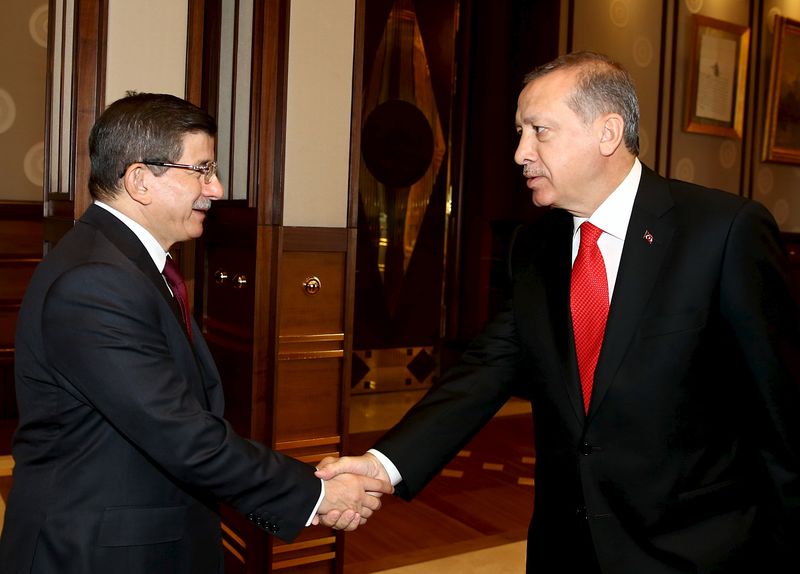By Tulay Karadeniz and Gulsen Solaker
ANKARA (Reuters) - Turkish Prime Minister Ahmet Davutoglu on Tuesday called on reluctant opposition parties to join an interim government ahead of new elections, but two refused and the third, a pro-Kurdish party, said it doubted he was serious.
Davutoglu was earlier appointed by President Tayyip Erdogan to form a temporary power-sharing cabinet and lead Turkey into an election on Nov. 1, after two months of coalition talks failed to produce a working government.
The prime minister has five days to form the interim cabinet and is obliged by the constitution to offer ministerial posts to members of the opposition. Should they decline, "independent" candidates from outside parliament can fill the posts.
Within hours, two opposition parties - the secularist CHP and the nationalist MHP - reiterated that they would not take part, raising the prospect of a cabinet dominated by Davutoglu's Islamist-rooted AK Party and propped up by outsiders who could include loyal bureaucrats and ex-AKP members.
The leader of the third opposition party, the pro-Kurdish Peoples' Democratic Party (HDP), said his deputies were ready to play a role but he would not be surprised if Davutoglu tried to exclude them.
"We cannot run the country by closing doors on each other. I am calling on opposition parties to take on this responsibility together through challenging times for our nation," Davutoglu told a news conference after being asked to form the government.
"We should avoid steps that create the impression of a political crisis in the country," he said, vowing to offer posts to opposition deputies even if their party leaders objected.
The uncertainty has knocked economic confidence in Turkey, unnerving investors already concerned about rising violence in the mainly Kurdish southeast and the threat of blowback after the NATO member last month opened its bases for U.S. coalition air strikes on Islamic State militants in Syria.
The lira currency has hit a series of record lows, while consumer confidence in the $870 billion economy has slumped to its weakest in six years.
While the opposition may challenge the legitimacy of Davutoglu's interim cabinet, there is little they can immediately do: no confidence vote is needed for it to function.
KURDISH ROLE CONTENTIOUS
The AKP, founded by Erdogan, lost its majority in a June 7 election for the first time since coming to power in 2002, complicating Erdogan's ambition of forging a more powerful presidency and plunging Turkey into political uncertainty not seen since the fragile coalition governments of the 1990s.
The participation in the interim cabinet of the HDP, which entered parliament for the first time in June after winning 13 percent of the vote, would be highly contentious, particularly as Turkish jets are bombing Kurdish militants.
The sight of Kurdish opposition politicians in cabinet seats would anger nationalists, potentially costing the AKP votes in November and again preventing a single-party government.
HDP leader Selahattin Demirtas said he believed all his party's deputies were eligible for cabinet positions, apart from its co-leaders, who will be responsible for election preparations. But he warned of efforts to exclude the HDP.
"We will have no hesitation in exercising our constitutional right and participating in the government," Demirtas told reporters in the capital Ankara.
"(But) we should not be surprised if they breach the constitution and try to form a government without HDP. Such an attempt would be rejected by the Constitutional Court."
MATTER OF PRINCIPLE
Declaring it part of a "synchronised war on terror", Turkey launched a military campaign against the Kurdistan Workers' Party (PKK) a month ago, bombing the Kurdish militant group's camps in the southeast and in northern Iraq in response to what it said were rising attacks against the security forces.
Foreign Minister Mevlut Cavusoglu told Reuters in an interview on Monday that 61 soldiers and police officers had been killed by the PKK and that air strikes on PKK targets would continue until the group laid down weapons.
The army said on Tuesday 34 PKK militants were killed in its latest air strikes in northern Iraq's Qandil mountain region.
Erdogan has accused Demirtas and the HDP of links to the militants - considered a terrorist group by Turkey, the United States and Washington - and has suggested that the immunity from prosecution of its lawmakers be lifted.
But the government has actively engaged the HDP in a peace process with the Kurdish militants and under Demirtas' leadership the party won higher-than-expected support in June, crossing a threshold to enter parliament for the first time.
"Six million people voted for us and we have the right to have three ministers," Demirtas said, adding that participation in the interim government was more a matter of principle than an attempt to accumulate political power.
"It doesn't really matter which ministries we get, all in all it's a temporary cabinet, and it doesn't have much chance of achieving much concrete action. We give importance to representation at the cabinet, that's all."
